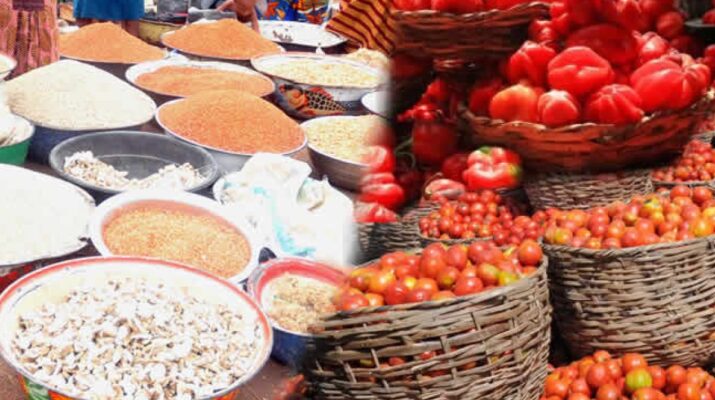The Federal Government under the administration of President Bola Ahmed Tinubu is caught in a web of multiple crisis as a result of shortage of food items across the country and soaring prices of available ones caused by its anti-citizens policies, however its panic measures to arrest the situation appear like a mere mockery of the angry masses
By Augustine Ojeikhoa
The unprecedented hunger in Nigeria is causing panic across the polity. Since the Japa syndrome has failed to assuage the frustration of citizens who now lack the financial muscle to flee to other countries, many citizens have resorted to committing suicide through various means. On Saturday, June 29, 2024, a middle-aged woman whom the police have yet to disclose her identity, threw herself down from the Ekpan Flyover, a community in Uvwie Local Government Area (LGA) of Delta State. Eyewitness reports said she died on the spot. More worrisome to her untimely death is the eyewitness account which added that she shouted on top of her voice that she was tired of contending with the hardship and hunger which she was forced to go through while she lived. In her estimation, it was better not to live than to be tormented to death by hunger. Numerous accounts of such ugly incidents are recorded across the country under the President Bola Ahmed Tinubu government. Hunger and hardship are causing many citizens to hate their lives.
Mr. Bennett C. Igwe is the Commissioner of Police (CP) in charge of the Federal Capital Territory (FCT), Abuja Command. The CP was saddened recently by the violent way and manner many frustrated citizens were attempting to end their lives violently because of the biting hunger in the land, and he had to threaten to arrest and prosecute any citizens engaged violent protests against hunger that would lead to committing suicide. The police top shot was livid when he reacted to the attempted suicide of a middle-aged man, Shuaibu Yushua who climbed a high broadcast mast at Aso Radio in Katampe, Abuja. Yushua was trying to jump from the top of the mast to end his life which he said was no longer desirable to him because of the hardship he was going through.
Fortunately, police officers attached to the FCT Command had to intervene to rescue Yushua alive. Eye witness account said officers from the FCT Police Command had negotiated with Yushua for hours to dissuade him from jumping down from the top of the mast which would have ended his live. Thus, he was persuaded to climb down. The police took him to custody. But on Monday, July 8, 2024, the FCT Police Command told the media that Yushua would be charged to court for attempted suicide, disturbance of public peace and incitement. The Command’s Public Relations Officer (PRO), Josephine Adeh, a Superintendent of Police, confirmed that Yushua would be charged if he was found to be stable mentally.
The food insecurity in the country is causing panic in many quarters, including among top political leaders. Recently, the Senate intervened, begging the Presidency to act fast before Nigerians begin to react violently.
The Senate has urged President Tinubu to urgently address the food insecurity across the nation.
The prayer followed a motion moved by Sunday Karimi (APC, Kogi West) and co-sponsored by Ali Ndume (APC, Borno South) at the Tuesday, July 16 plenary.
The motion titled, “Urgent Need to Address Food Insecurity and Market Exploitation of Consumables In Nigeria,” noted that in the last few months, the price of goods and household consumables has remained on continuous rise, leading to a high rate of inflation, weakened buying power, and general worsening of living conditions of the vast majority of Nigerians.
Karimi further noted that the latest data by Nigeria’s National Bureau of Statistics shows that, “food inflation in the country skyrocketed to 40.66 percent on a year-on-year basis, a significant increase from the 24.82 percent recorded in May 2023.
He said, “The current market price of food items such as beans, maize, rice paddy, yam, tomatoes, and onions which initially rose by about 40 per cent after the removal of petroleum subsidy has now increased to over 100 per cent to 300 per cent without any attributable reason for the increase in prices.”

“Although insecurity in food-producing regions, bad roads, increase in the cost of transportation attributable to the removal of fuel subsidy and depreciation of the value of Naira, are possible factors that have contributed to the increase in the price of food items, household commodities, and consumables, the percentage of increase in the cost of transportation and some under factors listed above, is significantly less than the percentage increase in the current prices of goods all ever the country.
“Concerned that the greater percentage of the increase in prices of food items and consumables in the country is not only due to these factors but to the zest of the merchants, traders, and retailers to make supernormal profits whilst they excuse the hike in price on these factors (depreciation of the Naira against the Dollar, increase in price of petroleum products due to fuel price increase and insecurity in farming regions), thereby heaping all the blame on the Federal Government.”
In his contribution, Senator Ndume lamented that this was the first time Nigeria was listed as one of the countries battling food insecurity.
According to Ndume, “Currently there are four countries including Sudan and some others that are facing very serious insecurity. Nigeria is added to this list this year by the International Rescue Committee as one of the spots for food insecurity action against hunger. World Food Program also indicated that over 32 million people are expected to face a critical hunger crisis and emerging level between and August.
“I don’t know about some other colleagues, but here in the North, we have started seeing it visibly. This is the first time we are experiencing this level of hunger. It’s the first time Nigeria is being listed as one of the countries with food insecurity.”
Contributing to the debate, former Senate President, Ahmad Lawan, said that the Nigerians have been extremely patient but for how long he couldn’t guarantee.
Lawan said, “Our constituents are facing real anger. I traveled to states, that’s with the northern states and I’ve seen firsthand how people, especially those who are neither in the civil service nor in any business common everyday constituents are suffering, fighting, struggling to have food even once in a day under normal circumstances.
“In the rainy season from maybe June up to September or October pending when there will be harvests, but now, the silos are empty, we don’t have anything in the silos.”
Lawan added, “In today’s national dailies, it is written that the Federal Government is considering reducing or removing taxes on imported foodstuff.
“Here’s the catch. This Senate must immediately engage the executive. What are the issues? Which taxes are they talking about? Because we should be seen to be doing the right thing. We have little or nothing in our food reserve across the country and nobody to come and tell us they will distribute foodstuff from our silos. The silos are empty.
“So it means we have to import food. And if we have to import, it means we need foreign exchange. This is why we have to engage with the executive. We have to help the administration.
“If we don’t take immediate action and our citizens are under this situation of increased foreign price, increased electricity price, increased everything, and we are yet to get the right measures to provide food for our citizens, we wouldn’t like the kind of thing that we’d see on our streets.
“It is time that we take every possible action together with the government to ensure that food flows in our country.
“The government must be entirely responsible because we cannot take people for granted for too long. People have come almost to the end of their patience.”
“The 1,200 bags of fertilizers (2 trucks), the government wants to give each of the Senators for distribution to constituents, should be done fast as further delay, we render the intervention, useless “, he said.
The Senate President, Godswill Akpabio in his remarks, said the food crisis facing the nation, was a calamity foretold through insurgency, banditry, and kidnapping, with attendant abandonment of farming by farmers.
The Senate President said that the distribution of the fertilizers must be properly monitored and ensure that it got to the appropriate quarters.
He said, “I have been informed by the chairman Senate Committee on Agriculture and the Deputy Senate president, that 60 trucks of fertilizers are to be distributed to state governors and they should be distributed to people irrespective of their political parties.”
The Senate, after that, urged the Federal Government to as a matter of urgency address the food crises across the country.
On Thursday, July 18, 2024, members of the House of Representatives in a panic measure promised to donate a paltry N300,000 part of their monthly salary to the Presidency to help in containing the hunger in the land.
The House of Representatives at a plenary session on Thursday, July 18 pledged to give up 50 per cent of their salaries for six months to address the hunger across the country.
During the session presided over by Speaker Tajudeen Abbas, Deputy Speaker Benjamin Kalu amended the motion, urging his colleagues to sacrifice 50 per cent of their salaries. He made this plea when it was his turn to speak, seeking their support for this gesture.
“This government is doing its best but one year is not enough to address the challenges of this country. I want to plead with our colleagues to sacrifice 50 per cent for a period of six months.
“Our salary is N600,000 a month. I want to plead that we let go of 50 per cent of our salary for a period of six months,” Kalu said.
With each member paying N300,000 into a common purse, the legislative chamber will be contributing N108m monthly to the Federal Government and N648m for six months. Many pundits have questioned what this sum of money can do in a country where over 120 million citizens are wallowing in hunger and abject poverty while the federal lawmakers have acquired vehicles for themselves worth over N200 million each in the recent time. These pundits argued that the bulk of the federal lawmakers’ earnings lies on their numerous allowances that run into several millions of naira per month for each lawmaker.
But many angry youths in the country across geopolitical zones have vowed to embark on a mass protest between August 1and 10, 2024 to compel the government both at the states and federal to seek ways to lessen the hunger, starvation and malnutrition in the country. The youths have already begun to mobilize on the social media, warning that the upcoming protest would be the mother of all protests in the country.
The Arewa Youth Consultative Forum (AYCF) and the National Consultative Forum (NCF) both of northern Nigeria extraction, have also warned the Federal Government to take proactive measures to arrest the hardship and hunger ravaging citizens before the crisis escalates out of proportion. The AYCF and NCF warned further that the prevailing harsh living conditions have reached a critical level that is leading to the escalation of frustration and anger among the populace.
The AYCF and NCF gave the warning via separate media statements issued by their Presidents-General, Yerima Shettima and Danjuma Paul respectively in Kaduna on Tuesday, July 16. Both groups alerted that the mounting resentment within the population had reached an alarming level.
The Oba of Lagos, Oba Rilwan Akiolu had called on Nigerians to still bear with the hunger a little while, exercise patience and pray for President Tinubu to succeed. According to a statement signed by Busola Kukoyi, the spokesperson for the wife of the president, Oluremi Tinubu, Oba Akiolu made the plea when Mrs Tinubu paid him a courtesy visit at his Iga Idugaran Palace in Lagos recently.
Oba Akiolu was quoted to have said, “All that I’m saying and appealing is that we should pray for Nigeria and the president. We should be patient, everything good needs prayers”.
In a panic move that has sparked criticism and serious warning, the Federal Government had rolled out some temporary measures which in its estimation could offer relief to the economic hardship caused by its disjointed policies of fuel subsidy removal and floating of the Naira.
On Wednesday, July 10, 2024, the Minister of Agriculture and Food Security, Abubakar Kyari told the nation via his X handle that President Tinubu had approved the suspension of duties and taxes on imported food items such as rice, maize wheat among others for a period of 150 days.
Kyari said, “Our administration has unveiled a series of strategic measures aimed at addressing the high food prices currently affecting our nation. These measures will be implemented over the next 180 days, including 150-day duty-free import window for food commodities.
“It also includes suspension of duties, tariffs and taxes for the importation of certain food commodities through land and sea borders. These commodities include maize, husked brown rice, wheat and cowpeas.
“Imported food commodities will be subjected to a Recommended Retail Price (RRP). We understand concerns about the quality of these imports, especially regarding their genetic composition.
“The government assures that all standards will be maintained to ensure the safety and quality of food items for consumption.
“The Federal Government will import 250,000 metric tonnes of wheat and 250,000 metric tonnes of maize. These semi-processed commodities will be supplied to small scale processors and millers across the country”.
Again, on Monday, July 15, 2024, the Federal Government said it had distributed 740 trucks of rice to the 36 states of the federation and FCT Abuja. Each of the states and FCT was given 20 trucks of 25kg bags of rice which the government said would be distributed to the vulnerable citizens in every state. This disclosure was made by the Minister of Information and National Orientation Mohammed Idris while briefing State House correspondents after the Federal Executive Council Meeting presided over by Tinubu.
Idris said, “Today (Monday July 15), we had the eighth council meeting of the year 2024 and a number of issues were discussed. Now, the Council deliberated on the state of affairs in Nigeria, especially the issue of food supply and shortage of food on the table of many Nigerians.
“After exhaustive deliberation, the Minister of Agriculture had earlier been directed to ensure that food is made available to Nigerians. And the understanding is that about 20 trucks of rice have already been supplied to each of the states of the federation and the Federal Capital Territory. Each of the trucks, of course, is carrying about 1,200 25kg bags of rice.
“This is part of the measures government is taking, in addition to so many others, to ensure that the hardship being experienced by Nigerians is drastically ameliorated.
“So, for a recap, each of the states government has received 20 trucks of rice for onward distribution to the most vulnerable. This is the first, and the Federal Government will continue to support all the state governors and local governments, all the subnational, so that the hardship being experienced by Nigerians, in terms of shortage of food supply, is breached”.
These measures have been Pooh poohed by many Nigerians who insisted that the relief being provided by the Federal Government is likened to the proverbial drop in the ocean which cannot be sustainable over a long period of time. Opinion leaders have also said that the sharing formula of the rice would be marred by corruption.
For example, the President of the Africa Development Bank (AfDB), Akinwunmi Adesina had last week warned that the planned suspension of duties, tariffs and taxes on imported food items for 150 days would affect the economy negatively.
Adesina said the decision by Nigeria’s government to allow massive food importation risks destroying the country’s agriculture.
Adesina said, “Nigeria’s recently announced policy (link is external) to open its borders for massive food imports, just to tackle short-term food price hikes, is depressing,” Adesina told African Primates of the Anglican Church at a Retreat in Abuja, Nigeria, on Friday.
He warned that the policy could undermine all the hard work and private investments that have gone into Nigeria’s agriculture sector.
“Nigeria cannot rely on the importation of food to stabilize prices. Nigeria should be producing more food to stabilize food prices, while creating jobs and reducing foreign exchange spending, that will further help stabilize the Naira,” said the African Development Bank president.
“Nigeria cannot import its way out of food insecurity,” he said, “Nigeria must not be turned into a food import-dependent nation.”
Similarly, the Financial Times of London, a British newspaper had criticized what it referred to as disjointed Tinubunomics shock therapy. The medium, in its publication of Tuesday, July 16, 2024, said, Tinubu government’s shock therapy would fail if important adjustments were not made.
Financial Times wrote, “In the nearly 15 months since Bola Tinubu became president, he has forced his 220mn fellow Nigerians to swallow some bitter medicine. He removed a generous fuel subsidy, one of the few benefits citizens receive from their inefficient and corrupt state. He allowed the country’s currency, the naira, to enter freefall, fuelling imported inflation and triggering the worst cost of living crisis in a generation. These measures have pushed tens of millions of already impoverished people deeper into misery. But they were necessary to begin correcting the country’s long-term economic demise. The fuel subsidy was ruinously expensive, guzzling nearly a third of the federal budget. It was also distortionary, channelling Nigerians’ energies into rent-seeking, smuggling and graft. The exchange rate regime, which vastly overvalued the naira, wiped out exports of everything but oil. While genuine industries were starved of hard currency, cronies accessed cheap dollars to sell on the black market. Nigeria’s elite learnt a lesson that was toxic to the nation’s prospects: why produce anything when you can make a killing through arbitrage? Moving to more orthodox policies is vital to reset an economy that has not grown in per capita terms for a decade and where one of the most lucrative industries has been kidnapping. It is necessary, but insufficient. “Tinubunomics” is so disjointed it barely deserves the name. Shock therapy will probably fail if important adjustments are not made”.




